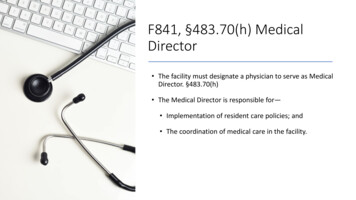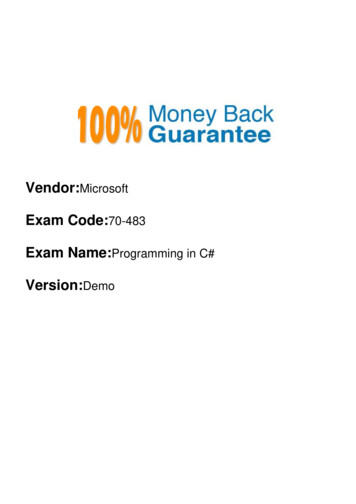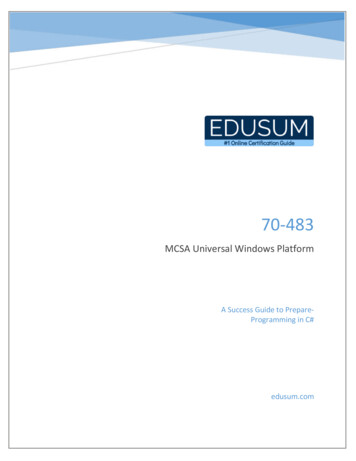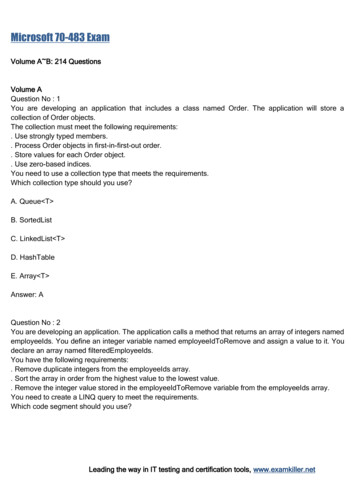
Transcription
F841, §483.70(h) MedicalDirector The facility must designate a physician to serve as MedicalDirector. §483.70(h) The Medical Director is responsible for— Implementation of resident care policies; and The coordination of medical care in the facility.
VALU E OF AN E NGAGE D ANDCOMPE TE NT ME D IC ALDIREC TOR
ABPLMMedicalDirectorCertification,Step 1 Completion of a U.S. ACGME or AOA accredited postgraduate training program and U.S. state licensure topractice medicine Current, unrestricted, state license as an MD or DO in theU.S Spend a minimum of 8 hours each month in service as amedical director in a post-acute and long-term care setting Completion of “AMDA’s Core Curriculum on MedicalDirection in Long Term Care” (or its equivalent) within five(5) years Demonstrated current professional integrity, competence,training, and experience and moral character.
Two (2) years of clinical practice in post-acute and longterm care within the past five (5) years AND Current ABMSor AOA Certification in a Primary Specialty WITH EITHER Completion of an ACGME or AOA accredited fellowship ingeriatrics or other relevant clinical program completedStep 2, Option 1 within the preceding five (5) years of application (e.g.pediatric, psychiatric, MR/DD) OR ABMS Certificate of Added Qualifications in GeriatricMedicine or other equivalent certification (e.g., hospice,home care)
Three (3) years of clinical practice in post-acute and longterm care within the past five (5) years ANDStep 2, Option 2 Current ABMS or AOA Certification in a Primary SpecialtyAND Sixty (60) hours of AMA PRA Category 1 CreditsTM, AAFPapproved, or AOA-approved credits in Clinical Medicinerelating to post-acute and long-term care in the precedingthree (3) years. A minimum of 12 of these credits mustcome from live course-work. Up to 48 of these credits cancome from self study activities.
Step 2, Option 3 Four (4) years of clinical practice in post-acute and longterm care within the past five (5) years AND Seventy-five (75) hours of AMA PRA Category 1 Credits,AAFP-approved, or AOA-approved credits in Clinical Medicinerelating to post-acute and long-term care in the precedingthree (3) years of application A minimum of 15 of thesecredits must come from live course-work. Up to 60 of thesecredits can come from self study activities
Step 3, Option 1 Two (2) years post-fellowship, within a five-year periodpreceding CMD application submission, in the role of medicaldirector or associate medical director in a post-acute andlong-term care facility/setting AND Completion of a fellowship in geriatric medicine within thepast five (5) years
Step 3, Option 2 Three (3) years, within a five-year period preceding CMDapplication submission, in the role of medical director orassociate medical director in a post-acute and long-term carefacility/setting AND 14 hours of approved CMD Management courses withinfive (5) years of application.
Four (4) years, within a five-year period preceding CMDapplication submission, in the role of medical director orassociate medical director in a post-acute and long-termcare facility/setting ANDStep 3, Option 3 Completion of an Individualized Education Program (IEP) inpost-acute and long-term care Medical Managementequivalent to the Core Curriculum for a minimum of seventyfive (75) contact hours within five (5) years of application. Awritten plan for the IEP must be submitted and approved bythe ABPLM Board of Directors prior to completion of theprogram and submission of the application (all IEPcoursework must be reviewed and approved by the ABPLMBoard of Directors)
AB 749:MedicalDirectorCertificationA SNF medical director must, within 5 years ofinitial hire, be certified by the American Boardof Post-Acute and Long-Term Care Medicine,or an equivalent organization as determinedby the department, as a Certified MedicalDirector.A medical director already employed by SNFas of January 1, 2022, shall have until January1, 2027, to become a Certified MedicalDirector.
SNF shall submit the following information on the medicaldirector:ReportingRequirements An HS 215A form or its successor form. A résumé. Whether medical director is certified as a Certified Medical Directoraccording to the requirements established by the American Board of PostAcute and Long-Term Care Medicine or an equivalent organization asdetermined by the department. If the medical director is not yet certified, the expected date ofcertification.SNF shall notify department of any changes within 10calendar daysAll SNFs shall report to the department the name andcertification status of the facility’s medical director no laterthan June 30, 2022.
Medical director responsibilities mustinclude their participation in: Administrative decisions including recommending, developingand approving facility policies related to resident care. Residentcare includes the resident’s physical, mental and psychosocialwell-being; Issues related to the coordination of medical care identifiedthrough the facility’s quality assessment and assurancecommittee and other activities related to the coordination ofcare; Organizing and coordinating physician services and servicesprovided by other professionals as they relate to resident care; Participate in the Quality Assurance PerformanceImprovement (QAPI) committee
Responsibilities should include,but are not limited to: Ensuring the appropriateness and quality of medical care andmedically related care; Assisting in the development of educational programs for facility staffand other professionals (e.g., in-services on topics of identified need); Working with the facility’s clinical team to provide surveillance anddevelop policies to prevent the potential infection of residents; Cooperating with facility staff to establish policies for assuring that therights of individuals (residents, staff members, and communitymembers) are respected; Supporting and promoting person-directed care such as theformation of advance directives, end-of-life care, and provisions thatenhance resident decision-making, including choices regarding medicalcare options;
If a deficiency has beenidentified regarding aresident’s care Medical Director should have hadknowledge of a problem with care, orphysician services, or lack of resident carepolicies and practices that meet currentprofessional standards of practice *If there is a clear facility issue andthey did not bring their Medical Directorinto the loop, this is problematic—facilities need to solicit and implementMedical Director input into identifiedclinical problems.
The bill requires healthcare practitionersauthorized to issue prescriptions to have thecapability to transmit electronic data onsof AB 2789Requires pharmacies to have the capability toreceive those transmissions.Requires those healthcare practitioners to issueprescriptions as an electronic data transmissionprescription, unless specified exceptions are metby January 1, ing-mandate
Does not require the pharmacy to verify that a written, oral,or faxed prescription satisfy the specified exemptions.E-prescribingInterpretationsof AB 2789Pharmacies receiving electronic data transmissionprescriptions are required to immediately notify theprescriber if the electronic data transmission prescriptionfails, is incomplete, or is otherwise not appropriatelyreceived.The pharmacy is also required to transfer or forward theprescription to another pharmacy at the request of thepatient, as escribing-mandate
F841, §483.70(h) Medical Director The facility must designate a physician to serve as Medical Director. §483.70(h) The Medical Director is responsible for— Implementation of resident care policies







